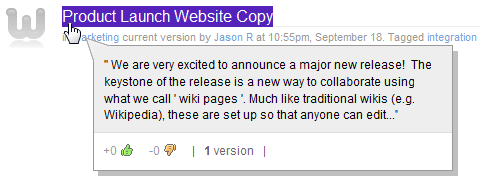Enterprise 2.0 and business collaboration

Update: I hit "publish" before the article was completely finished, so I've added some images and updated some links. I can't pull the post without it leaving a trail behind it, so I may as well just own up now and say, "whoops, sorry".
GroupSwim Collaboration, in a nutshell, is a SaaS social and business collaboration tool, solution, application - whatever you want to call it. With "Collaboration", it's a hosted service by GroupSwim which could well be used as a replacement for SharePoint. Although it doesn't have all the features of SharePoint, it still works extremely well, if not better, than SharePoint in small to medium enterprises.
There are many key features of Collaboration: the main one is that it appears in forum and group form. It can be a central point of contact from a customer's perspective to get in touch with after-sales care. With forums and groups, even wiki functions for small enterprises and businesses, there are some obvious similarities with Google Groups with some exceptions. One person can be part of different groups, and with AJAX and Web 2.0 (or as it's an enterprise web application, Enterprise 2.0) style for the site, it boasts over-over tabs to get more detail on something before you look.

It can be served along side these features as a document repository. You can directly upload to a group, forum or wiki, attach to discussions you're having with work colleagues or consultants, clients and customers, or email them in using your unique GroupSwim email which is provided for you.
Every file has a unique page - just as SharePoint does. However what interested me was the enterprise social network feel to it. It has a version tracker and a download counter, whilst behind the scenes it's being indexed word for word, byte for byte. Because not everybody had the available plugins for viewing the documents, they use an API available from Scribd which provides the ability to access and preview those documents in full.
Web 2.0 features and the integrated wiki -->
Alongside this, it has a "yea" or "nay" system; voting in enterprises is extremely useful when publishing documents, FAQ's, presentations or whitepapers. Collaboration measures the user behaviour in a non-intrusive or anti-privacy way, checks against your own watchlist and the importance of the content. It turns votes into different shades of greens and other colours depending on the importance and relevance it either has to you as the user, or in the discussion or wiki.In any enterprise, regardless of whether you're a SMB or a fully fledged corporation, security is of great importance. You can secure any particular wiki, group and who can edit what and who can or can't view something. Without the overly complicated security settings you may see in other products *cough* Windows *cough*, you're given the basics and therefore the essentials: members only, specific groups of people, only you, and managers only.
Having said that, security can be altered by those who require it to a fully customisable policy for each user or groups of users. Of course again, this reduces the intern doing something stupid, and makes it even more idiot-proof.
Incredibly powerful searching and indexing -->
Another major issue that enterprises with large structures, groups of users, departments and masses of documents and files, searching for what you need and when you need it is vital. With discussions and files, it includes suggested tags which are generated automatically. You can add your own but it picks out keywords and important tags for searching and indexing. It uses natural language processing, similar to the system used in Vista. With this, you can train tags to pick up on specific tags such as "SaaS", "marketing" or "whitepapers", depending on which type of industry your enterprise works with.If a particular user has edited a wiki page with more and more content, subscribed to group feeds and contributed to them on a particular subject; maybe if a user has published a lot of whitepapers or documents on a particular subject, they'll be given an "authority" tag next to their name in search results. The authority tag is automatically generated by Collaboration, and makes it far easier to see who the experts on a particular subject are.
Overall, it's a fantastic product which has certainly opened my eyes to other alternatives to SharePoint - something which I'm not the biggest fan of, to be quite honest.